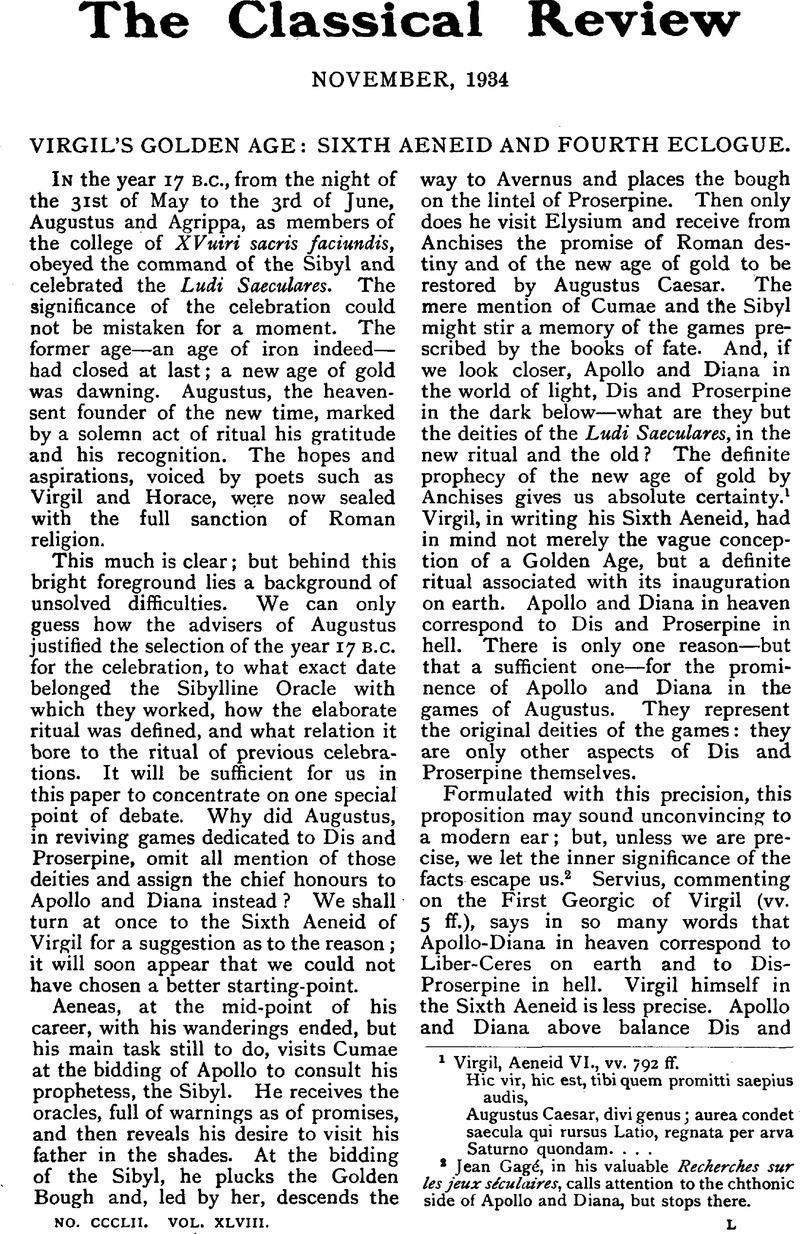Article contents
Virgil's Golden Age: Sixth Aeneid and Fourth Eclogue
Published online by Cambridge University Press: 27 October 2009
Abstract

- Type
- Review Article
- Information
- Copyright
- Copyright © The Classical Association 1934
References
page 161 note 1 Virgil, Aeneid VI., vv. 792 ff. Hic vir, hic est, tibi quern promitti saepius audis, Augustus Caesar, divi genus; aurea condet saecula qui rursus Latio, regnata per arva Saturno quondam….
page 161 note 2 Jean Gagé, in his valuable Recherches sur les jeux séculaires, calls attention to the chthonic side of Apollo and Diana, but stops there.
page 162 note 1 Cp. Virgil, Aeneid VI., v. 247. Voce vocans Hecaten, caeloque Ereboque potentem.
page 162 note 2 Wissowa, , Religion und Kultus der Römer (2nd edition, 1912), pp. 236 ff., 296.Google Scholar
page 162 note 3 Horace, , Carmen Saeculare, vv. 33, 34.Google Scholar
page 162 note 4 Virgil, Aeneid VIII., vv. 704–706. Actius haec cernens arcum intendebat Apollo desuper: omnis eo terrore Aegyptus, et Indi, omnis Arabs, omnes vertebant terga Sabaei.
page 162 note 5 Cp. again Wissowa, op. cit., p. 296.
page 162 note 6 Suetonius, Divus Augustus, ch. 70: Auxit cenae rumorem summa tunc in civitate penuria ac fames, adclamatumque est postridie, omne frumentum deos comedisse et Caesarem esse plane Apollinem, sed Tortorem: quo cognomine is deus quadam in parte urbis colebatur.
page 162 note 7 Virgil, Georgics I., vv. 36, 37.
page 162 note 8 Tacitus, Annals II. 41. Sacrarium genti Iuliae effigiesque Divo Augusto apud Bovillas dicantur…. The coin evidence is collected in Num. Chron., 1933, pp. 232 f.
page 162 note 9 Hirschfeld, Kleine Schriften (Das Neujahr des tribunischen Kaiserjakres), pp. 438 ff. The vital point is that Domitian, who celebrated his games in A.D. 88, followed the computation of Augustus (Suetonius, Domitian, ch. 4): this points to 23 or 22, not 17 B.C., as the true year.
page 163 note 1 Is it possible that there is some connexion between the famous ‘Golden Bough’ of the Sixth Aeneid and the boughs carried by the boys and girls in the processional chorus to Apollo and Diana? Cp. the sestertius of Domitian, Mattingly and Sydenham, Roman Imperial Coinage II., p. 201, no. 379. Servius (Aeneid VI., vv. 136 ff.) is not necessarily talking nonsense when he associates the bough with Aricia and the bough plucked by the rex nemorensis: Cumae and Aricia were intimately related from early times.
page 163 note 2 Mattingly and Sydenham, op. cit., I., p. 73, nos. 141, 142.
page 163 note 3 Gardthausen, Augustus und seine Zeit I., p. 1010 f.; II., pp. 622 f.
page 163 note 4 Virgil, Aeneid VI., v. 28.
page 163 note 5 Virgil, op. cit., vv. 835, 836.
page 164 note 1 Virgil, op. cit., vv. 818 ff.
page 164 note 2 Cp. the aureus with obv. head of first consul, rev. head of M. Brutus, B.M.C. Republic II., p. 477, no. 57; Plutarch, Life of Brutus, ch. 9.
page 164 note 3 Virgil, Aeneid II., vv. 682 ff. Ecce levis summo de vertice visus Iuli fundere lumen apex, tractuque innoxia molli lambere flamma comas, et circum tempora pasci.
page 164 note 4 J.R.S., 1932, pp. 135 ff., esp. 152 ff.
page 164 note 5 This hypothesis at least faces the difficulties of the poem and would explain some phrases which, in 40 B.C., are surprisingly prophetic— ‘tuus iam regnat Apollo’ (v. 10), ‘pacatumque reget patriis virtutibus orbem’ (v. 17). Cp. a note in C.R., 1930, pp. 57 ff.
If the poem was written originally for a child of Octavian and Scribonia—who turned out to be Julia—the dedication to the Antonian Pollio is unintelligible. If the child was simply a child of Pollio himself, could Virgil have failed to say so? The reference to the Treaty of Brundisium and the marriage of Antony and Octavia that sealed it seems inescapable.
page 165 note 1 Virgil, Eclogue IV., v. 49, ‘magnum Iovis incrementum’. Cp. A. Alföldi, Num. Chron., 1929, pp. 265 ff. For the coins, cp. Mattingly and Sydenham, Roman Imperial Coins V., I., p. 117, no. 13 (IOVI CRESCENTI); p. 119, no. 32 (PIETAS SAECVLl/IOVI EXORIENTI); p. 127, no. 35 (DII NVTRITORES).
page 165 note 2 Symmachus, Laudatio in Gratianum Augustum, A.D. 369: 3. 9. si mihi nunc altius evagari poetico liceret eloquio, totum de novo saeculo Maronis excursum vati similis in tuum nomen exscriberem; dicerem caelo redisse Iustitiam et ultro uberes fetus iam gravidam spondere naturam … et vere, si fas est praesagio futura coniicere, iamdudum aureum saeculum currunt fusa Parcarum.
page 165 note 3 Cohen, Monnaies Impériales (Gratian), no. 13.
page 165 note 4 For the types, see Cohen, op. cit. Constantius II., nos. 31 ff. Cp. also Num. Chron., 933, PP. 182 ff., esp. 191 ff.
- 2
- Cited by




